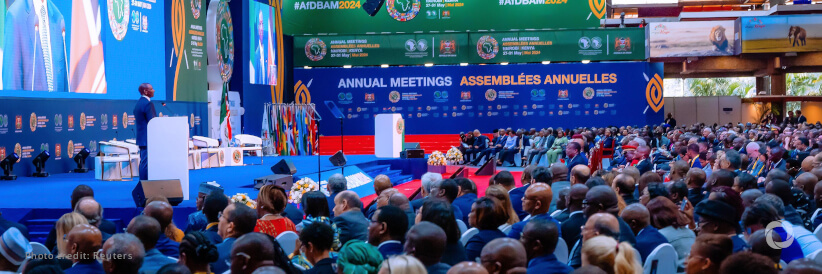The African Development Bank’s ongoing Annual Meetings offered an opportunity to assess its partnership with Italy under the Mattei plan, which aims to boost trade and economic development across the continent.
At a panel session held on 27 May, participants from the private sector, the Italian government, and the Bank had a conversation on how the Mattei Plan for Africa – Italy’s bold drive to boost economic and strategic partnerships with African nations and institutions – is working so far. Italy has stated that the African Development Bank Group will be its leading strategic financial partner for implementing the Plan.
Opening the session, Gauthier Boulard, Director and Special Advisor to the Cabinet of the African Development Bank President, said the partnership marked a strategic shift from aid to co-partnership.
The Rome Process/Mattei Plan Financing Facility (RPFF), a multi-donor special fund, is set to co-finance African Development Bank sovereign and sovereign-guaranteed projects in agri-business, energy, environment, and industrialization, among others, to transform economies and help address the root causes of migration.
“This is a real shift from traditional aid to co-investment strategic sectors that generate jobs …and that will address migration,” Boulard said.
Daniel Schroth, African Development Bank Director of the Renewable Energy And Energy Efficiency Department, was joined on the panel by Ludovic Ngatse, Minister of Economy and Planning, Republic of Congo, and Victor Hugo Guilherme, Minister of Economy and Planning, Angola; head of development finance at CDP Giulio Dal Magro, Lorenzo Ortona, Deputy Coordinator of the Mission Structure for the Mattei Plan and Domenico, Executive Director for Italy, UK and the Netherlands and Francesca Utili, Alternate Governor for Italy.
Ngatse and Guilherme shared examples of projects in their countries already providing opportunities for growth and diversification of their economies, such as the Lobito corridor in Angola.
“Angola considers the Mattei Plan initiative as a concrete opportunity to speed up our social and economic development under a mutual partnership,” Guilherme said, adding that the project would help reduce dependency on oil as a primary source of revenue, and provide jobs for its youth. Angola was also seeking to increase agricultural production to promote job creation and food security, Guilherme said.
When completed, the Lobito Corridor will expand an economic corridor connecting the host countries to global markets to enhance regional trade and growth, and to advance the shared vision of connected, open-access rail from the Atlantic Ocean to the Indian Ocean.
Ngatse said Congo, one of the first African countries to benefit from the Plan, has made agriculture the primary focus of its development strategy for 2022-2026. Congo sees the Plan as a pathway to reduce dependency on food imports and to ensure food security, he said, in addition to boosting transportation and energy access.
“We do need massive investments for this strategy to be implemented,” Ngatse added.”
Ortona disclosed that the Mattei plan, which has expanded to include other partners such as the United Arab Emirates and the Global Gateway of the European Union, is at the top of Melloni’s agenda.
He added that water, agriculture, electrification, and energy represent a key opportunity to bring the best technology from the private sector to connect the development needs in Angola and Congo with the Italian approach.
The vision of the Mattei plan aims to be cross-cutting – “not just to cooperate but a different way completely from traditional aid. The idea stems from the notion that Europe and Italy have no future without a partnership with Africa, and vice versa. This is a mutually beneficial relationship. We are here for business. We want to grow together,” Fanizza said.
The African Development Bank is also examining the Mattei plan as a model for leveraging partnerships in both bilateral and multilateral ways, with a focus on prioritizing the private sector.
“Particularly, we want to explore de-risking investments,” Fanizza said.
Italy will explore new partnerships and co-finance projects with the African Development Bank in infrastructure, climate finance, as well as other sectors, including project preparation and the private sector.
“I think there is a bright future for collaboration between the two institutions,” Dal Magro said.

